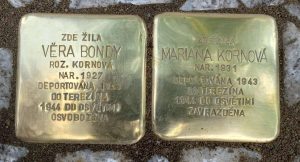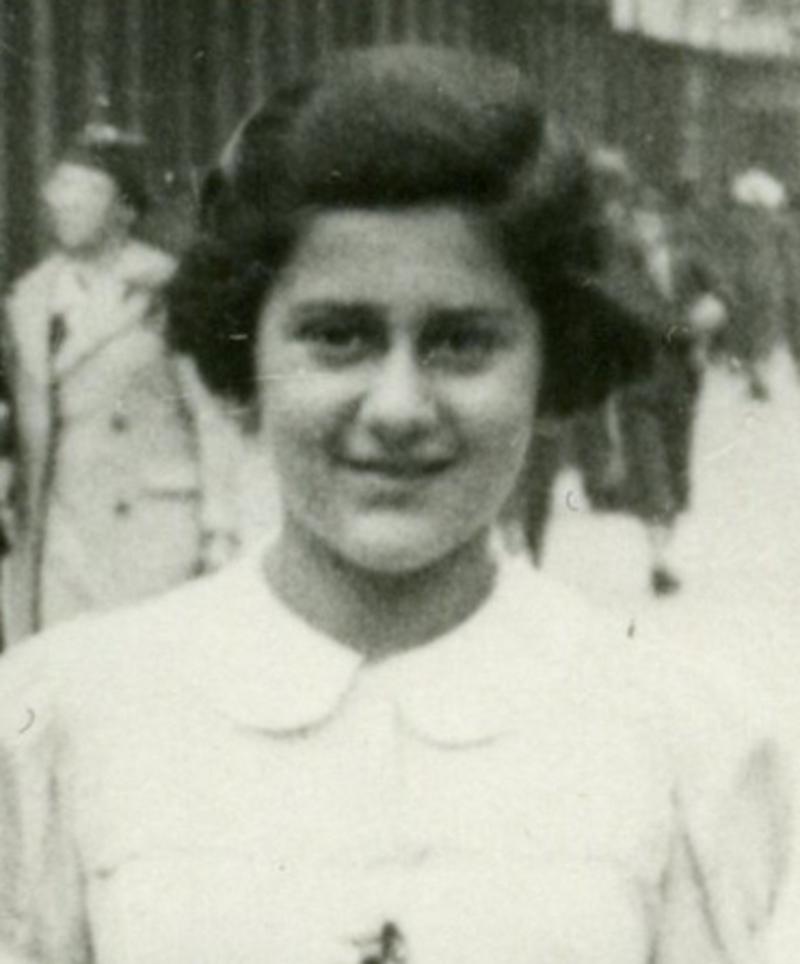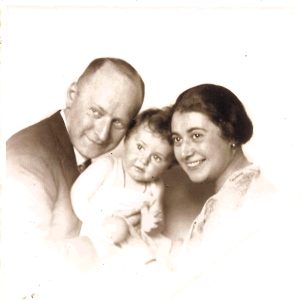 Address: LONDÝNSKÁ 596/28, PRAGUE 2
Address: LONDÝNSKÁ 596/28, PRAGUE 2
Born 10. 03. 1927
Last residence before deportation: Prague II
Address/place of registration in the Protectorate: Prague II, Štěpánská 14/611
Transport AAw, no. 506 (03. 08. 1942, Prague -> Terezín)
Transport Dr, no. 208 (15. 12. 1943, Terezín -> Auschwitz)
Murdered
 Vera and parents.
Vera and parents.
The Korn family (father Richard, mother Cecilie, and daughters Vera and Mariana) were a Czech Jewish family from Ostrava. They had a happy life together, full of art, music and nature, that was cruelly and tragically cut short. Some of their favorite family pastimes were attending opera at one of Ostrava’s two opera houses, and taking vacations to the Tatra mountains in Slovakia.
Richard was born in Ostrava in 1892. He was an educated, modern, liberal man, not particularly religious, with a great sense of humor. Before the war, Richard and Cecilie together owned and operated a thriving, imported shoe store on the main square of the city. Richard played music constantly in the house – opera in particular – and transmitted a love of music to his children. As his surviving daughter Vera recalls, “he believed that the best way to bring up children was to trust them, and his children never broke that trust. He was against all nationalism, believing that the only thing you can really be proud of is your own achievements.”
Cecilie Kornova (nee Schroterova) was also born in Ostrava, in 1899. She was remarkable for a woman of her time in that she had both an education and a career, using her skills as the bookkeeper of the family shoe store. She came from a large, warm family herself, with two sisters, and a younger half-brother. Her father, Marcus, had a dry goods store in Ostrava, and a telephone – a rare modern amenity that delighted the children. As her daughter Vera recalls, she was a highly rational, understanding and warm mother, and passed on to her children a love of art and nature.
Cecilie and Richard’s youngest daughter, Mariana, was born in 1931, and was still a young child when their life together was upended. She had a keen intellect, and a remarkable talent for writing. After being sent to Terezin, she started a children’s magazine called “Hlas Pudy” (“The Voice of the Attic”). Her writing there shows a sophistication with language and awareness of the absurd ironies of life under Nazi imprisonment that goes beyond her years, but also shows a fervent hope for a brighter future. In her sister Vera’s words: “It is terrible that she wasn’t allowed to blossom into what she was supposed to become. She would have certainly been a writer. Throughout the years, I always look for her in the faces of my children and grandchildren.”
In 1939, the Nazis seized Ostrava, confiscated the family shoe store, and briefly detained Richard and Cecilie, after which the family relocated to Prague. Richard and Cecilie did their best to recreate a sense of normalcy at their apartment in the Vinohrady neighborhood, but this became increasingly difficult. The children were only allowed one more year of school, before this and many other rights were taken away. Richard and Cecilie made plans to emigrate to Chile but, after many delays, these plans were never realized. In 1943, the family was deported to Terezin. In 1944, they were deported to Auschwitz, where Richard, Cecilie and Mariana were murdered.
